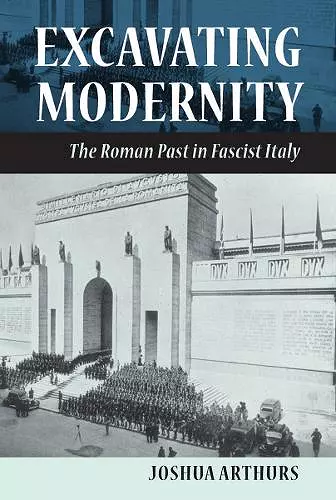Excavating Modernity
The Roman Past in Fascist Italy
Format:Hardback
Publisher:Cornell University Press
Published:15th Aug '12
Currently unavailable, and unfortunately no date known when it will be back

The cultural and material legacies of the Roman Republic and Empire in evidence throughout Rome have made it the "Eternal City." Too often, however, this patrimony has caused Rome to be seen as static and antique, insulated from the transformations of the modern world. In Excavating Modernity, Joshua Arthurs dramatically revises this perception, arguing that as both place and idea, Rome was strongly shaped by a radical vision of modernity imposed by Mussolini’s regime between the two world wars.
Italian Fascism’s appropriation of the Roman past—the idea of Rome, or romanità— encapsulated the Fascist virtues of discipline, hierarchy, and order; the Fascist "new man" was modeled on the Roman legionary, the epitome of the virile citizen-soldier. This vision of modernity also transcended Italy’s borders, with the Roman Empire providing a foundation for Fascism’s own vision of Mediterranean domination and a European New Order. At the same time, romanità also served as a vocabulary of anxiety about modernity. Fears of population decline, racial degeneration and revolution were mapped onto the barbarian invasions and the fall of Rome. Offering a critical assessment of romanità and its effects, Arthurs explores the ways in which academics, officials, and ideologues approached Rome not as a site of distant glories but as a blueprint for contemporary life, a source of dynamic values to shape the present and future.
Arthurs does an excellent job in showing the debates and struggles between contrasting visions of Romanita in the 1938–1945 period.. In the end, Arthurs's book is an enormous contribution to our understanding of the fascist cultural project.
-- Paul Baxa * American Historical Review *Is there anything left to say about Fascist Italy's connections to the country's Roman past? Surprisingly enough, there is, and Joshua Arthurs's new book illustrates how non-party institutions configured the image of that past institutionally, outside of the party and regime propaganda machines.. Arthurs's narrative is crisp, lucid and rich with little-known and often unknown information. The particular accomplishment here is the detailed and thoughtful examination of seldom-studied institututions and the individuals who comprised them that were not explicitly fascist, but whose studies, exhibits, journals, and conferences cohered with the Regime.
-- Diane Yvonne Ghirardo * Canadian Journal of History *That Italian fascism would adopt Rome as a fundamental part of its ideology, though it seems obvious now, was not a given at the start of the movement. As Joshua Arthurs notes, Rome was associated with the decadent liberal state and with the Catholic Church. Fascism, in contrast, meant modernity and dynamism.. Arthurs has given us an excellent, concise summary of what Rome meant to fascism. It is a valuable guide to scholars and to general readers.
-- Alexander De Grand * The Historian *With Excavating Modernity, Joshua Arthurs has contributed a welcome analysis of the place of romanità—the vogue or cult of ancient Rome—in Fascist Italy...[We] can only be grateful for this well-written, thoroughly documented, and carefully nuanced treatment.
-- David D. Roberts * The Journal of Modern HistoISBN: 9780801449987
Dimensions: 235mm x 155mm x 21mm
Weight: 907g
232 pages